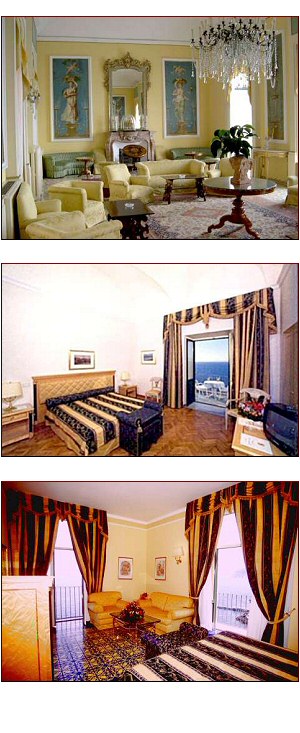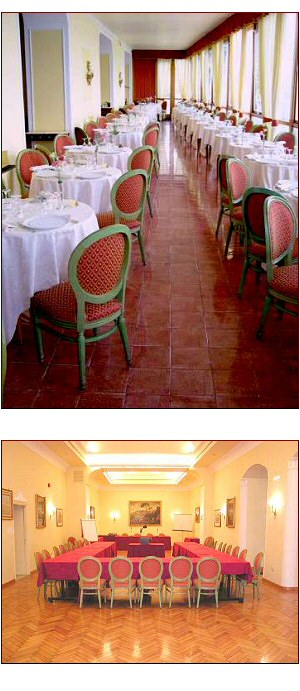
IMPERIAL HOTEL
TRAMONTANO
La
Storia: Attraverso la sua lunga storia,
inizialmente come casa privata e dal 1812 come albergo,
l'Imperial H˘tel Tramontano ha avuto il grande privilegio
di ospitare le pi¨ grosse personalitÓ del mondo letterario.
E' ormai leggenda che questo albergo fu visitato da Milton,
durante i suoi lunghi viaggi. Al Tramontano soggiornarono
inoltre Goethe, Byron, Scott, Shelley, Lamartine, Musset,
Keats, Leopardi e Longfellow. James Fenimore Cooper visse
qui per tutto il tempo in cui mise in opera "Water Witch" e
Harriet Beecher Stowe vi trov˛ l'ispirazione per "Agnese di
Sorrento". Durante il suo lungo soggiorno, durato sei mesi,
Ibsen scrisse il suo immortale "Spettri".
La famosissima canzone "Torna a Surriento" fu composta da
G. B. De Curtis sulla terrazza del Tramontano.
Il
Giardino: Il giardino, architettato nel 1880 da
giardinieri inglesi, conserva rare piante secolari
mediterranee e subtropicali. Circondato da piante di agrumi
locali e da fioriture di antiche e giovani varietÓ di
Camelia.
La
Hall: E' la vecchia corte ottocentesca, oggi
giardino d'inverno, arricchita di antiche statue e piante
esotiche che danno un caldo ed accogliente benvenuto
all'ospite.
Le
Camere: Le camere e le suites sul mare o con
veduta sul lussureggiante giardino, sono deliziose ed
accoglienti, ognuna particolare e diversa dalle altre, ma
tutte dotate dei principali comforts:
- telefono diretto
- aria condizionata
- TV a colori satellitare
- frigo bar etc
La posizione a picco sul mare permette al blu del mare di
avvolgere le camere e i terrazzini dedicati alla prima
colazione.
Terrazzo: La magnifica vista del
golfo di Napoli dal famoso terrazzo dove fu scritta la
celeberrima canzone "Torna a Surriento".
Il
Salotto: Lo splendido salone "Quattro Stagioni",
nome derivante dalla presenza degli affreschi dell'artista
napoletano G. B. De Curtis, conserva ancora il prezioso
maiolicato napoletano ed affaccia direttamente sulla
terrazza a mare.
Il
Ristorante: Di giorno si proietta nell'azzurro
del mare e del cielo, mentre di sera, riserva un'atmosfera
romantica con i lieti motivi delle lampare a mare.
La cucina, che vanta antiche ricette del capostipite
Alfonso Iaccarino, come i "cannelloni", oggi continua la
tradizione dell'arte culinaria napoletana con i profumi e i
sapori degli ortaggi coltivati, in modo naturale, nei
propri fondi agricoli.
La
Spiaggia: L'ascensore, che attraversa 60 metri
di cavitÓ del costone tufaceo, collega direttamente i piani
dell'albergo con la spiaggia sottostante.
Da maggio a settembre, una tipica imbarcazione sorrentina,
per un massimo di dieci persone, Ŕ prenotabile per
escursioni sia di mattina che di pomeriggio lungo la costa
ed il Golfo, offrendoVi la possibilitÓ di scoprire le baie
pi¨ incantevoli, le spiagge pi¨ nascoste, per un tuffo
nelle acque cristalline delle Sirene, tra mito, leggenda e
bellezze naturali incomparabili.
Sala
Congressi: L'Imperial H˘tel Tramontano dispone
di sale riunioni in grado di ospitare da 10 a 200 persone
per ogni tipo di meeting, congresso o riunione aziendale,
con eventuali coffee breaks e colazioni di lavoro.
La sala settecentesca "Aminta" dispone di impianto di
amplificazione, registrazione audio e video, proiezione
video, diapositive e pellicole, telefono diretto, aria
condizionata, passerella per sfilate.
Dove siamo:

IMPERIAL HOTEL
TRAMONTANO
The
Story: Through its long history as a private
mansion and as a hotel the Tramontano has sheltered many
great people of the literary world.
It is legendary that Milton visited this shrine during his
travels; and it was graced by Goethe, Byron, Scott,
Shelley, Musset, Lamartine, Keats, Leopardi and Longfellow.
James Fenimore Cooper lived here while writing the "Water
Witch" and Harriet Beecher Stowe here found her inspiration
to write "Agnes of Sorrento". Henrik Ibsen lived at the
Tramontano for six months and wrote his immortal "Ghost"
during that time.
"Turna a Surriento" - "Come back to Sorrento", by G. B. De
Curtis was composed on the terrace of the Hotel.
The
Garden: The garden, designed by English
gardeners at the end of the 19th century, conserves rare
Mediterranean and sub-tropical trees. Surrounded by local
orange and lemon plants and from Camelias of all ages.
The
Hall: It's the old 18th century court, today
winter garden, richened by antique statues and exotic
plants which give the guests a warm welcome.
Rooms:
The rooms and the suites overlook the sea or the splendid
garden, they all give a warm welcome, each different from
each other, but complete with all comforts:
- telephone
- air conditioning
- satellite TV
- minibar etc
The position of the rooms overlooking the sea allows you to
have a beautiful breakfast on the terraces, viewing the
Vesuvius and the panorama of the Gulf of Naples.
Terrace: The majestic view of
the Gulf of Naples from the balcony where the famous
song "Torna a Surriento - Come back to Sorrento" was
written.
The
Lounge: The splendid parlour "Quattro Stagioni",
name derived from the paintings of the Neapolitan artisit
G. B. De Curtis, still conserves the original mosaic
pavement and outlooks the terrace over the sea.
The
Restaurant: In the morning it blends with the
blue of the sea and the sky, while at night it reserves a
romantic atmosphere with spectacular lights of the "lampara"
The cuisine, which vants antique recipes of Alfonso
Iaccarino like "Cannelloni's", today continues that
tradition of Neopolitan cuisine, with the flavours of home
grown vegetables.
The
Beach: The lift that goes through 60 metres of
tufo, connects all the floors of the hotel with the under
laying beach.
From May to September, a typical Sorrentine boat, for a
maximum of 10 passengers, is bookable for morning or
afternoon excursions along the coast and the gulf, giving
you the possibility to discover the most beautifull bays,
the hidden beaches, where you can swim in the sea of the
Mermaids, between myths, legends and natural beauties.
Congress
Hall: The Imperial Hotel Tramontano has
conference rooms that are able to host from 10 to 200
persons for every type of meeting, congress or company
reunions, with coffee breaks, lunches and gala dinners.
The 17th century "Aminta" room has amplified audio, video
projection for slides and films, direct telephone, air
conditioning and the possibility to house fashion shows.
Where we are:
|
|
Imperial Hotel Tramontano
Via Vittorio Veneto, 1, Sorrento, NA, Italy




|
